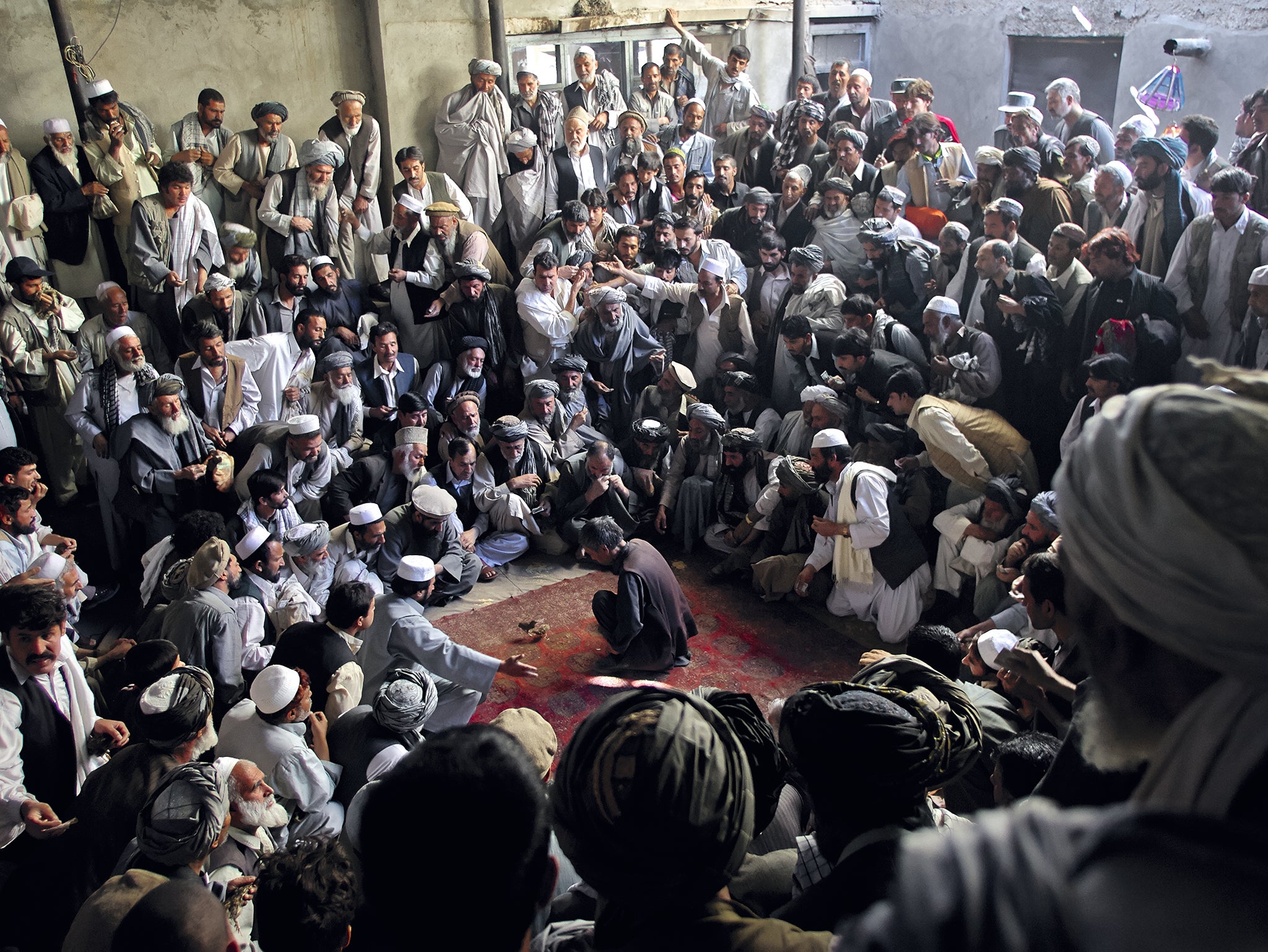The Hollow of the Hand, by PJ Harvey & Seamus Murphy - book review: Ballads for a war-torn age
Bloomsbury, £45

When PJ Harvey released her enduringly great war record Let England Shake, her inspirations included poetry by Harold Pinter, T S Eliot and Ted Hughes. Her decision, then, to publish her first fully fledged volume of verse – augmented by Seamus Murphy’s excellent photographs – doesn’t exactly surprise.
Harvey’s subject, as in that album, is war and its aftermath: the erosions of place and displacement of people, the depressingly recurrent historical resonances. Divided into three sections, the book is inspired by journeys to Kosovo, Afghanistan and Washington DC: “I took a plane to a foreign land/ and said, I’ll write down what I find” (“The Orange Monkey”). The dominant tone tolls elegiacally from the opening poem, “On a dirt road”: “Through a thousand fallen plums/ the purple-black flesh/ pushing out of their open skins/ darkening the road.” The imagery suggests an unhealing national bruise, one still so tender that blood might flow at any time.
Harvey’s imagination has always been acutely visual. Many poems feel like companion pieces to Murphy’s photographic reportage, capturing moments like this in Kosovo: “A boy stares through the glass/ He’s saying, Dollar, dollar. Three lines of traffic pass” (“The Glass’). That third line’s cool understatement does a piercing job of conveying the general, automatic indifference to a destitute child. Harvey is complicit (being driven in one of the unstopping cars), even as her empathy and the poem stands apart, if not aloof: “In the rear-view glass/ A face pock-marked and hollow that should be growing smaller/ is saying, Dollar, dollar. It stares back from the glass; I can’t look through or past.”
The best poems marry similar linguistic care with dishevelled forms: “I thought I saw a young girl/ between two pock-marked walls” (“The Abandoned Village”). The lines break nicely too at “between”, the silent pause enhancing the feeling of haunting and loss. Those “pock-marked walls” seem haunted by the “pock-marked” face in “The Glass”.
Poetry for Harvey seems to demand acts of uncomfortable sympathy: “Put my feet in your footprints,” she writes in “The Boy”. Again and again, this sympathy locks on to the dispossessed, as if Harvey is attempting a post-9/11 Lyrical Ballads: “Young boy in your face/ every loss I can trace” (“The Boy”). Other works, however, read more like lyrics for actual ballads. The impressionistic “Zagorka” is remixed into the splenetic, Pinteresque, slap-bang of “Chain of Keys”: “The dusty ground’s a dead-end track./ The neighbours won’t be coming back.”
Harvey the song-writer seems present too in the more regular stanzas of “The Orange Monkey”, or the Kipling-like urgency of “Charikar”: “They fight with kites. They fight with eggs./ They fight with goats without a head.” Some of the despairing black comedy of Let England Shake puts in an appearance, albeit in one of her less subtle efforts.
The Washington DC section lacks the intensity of “Kosovo” and “Afghanistan”. Two poems were inspired by visits to the Natural History Museum. Another sampled voices heard on the streets of the nation’s capital. Race, nationality and poverty ensure that Harvey is once again the outsider. Yet her alienation is not as complete, even when she approaches a group of homeless people beside a soup kitchen at 3am: “as the circle of men and women/ all of them with dark skin/let you in to stand with them”. Compare this with the opening of “Adhan” in Afghanistan: “The voices gathered and grew strong/ sending out a single prayer./ I listened, but did not belong.” That chiming harmony of the rhyme ironises the poet’s isolation.
One Washington poem does linger. “Medicinals” joins hands with a poem from the Afghanistan section called “Talking to Dog” to recall how nature outlasts humankind’s hubris: “I was always here/ says the shallow marshland/ from beneath the walkways of the National Mall.”
I would love to hear Harvey recite these lines, at once celebratory and deflated, as if John Clare had been dropped into a shopping centre. The Hollow of the Hand is a sincere and sincerely impressive collection.
Subscribe to Independent Premium to bookmark this article
Want to bookmark your favourite articles and stories to read or reference later? Start your Independent Premium subscription today.

Join our commenting forum
Join thought-provoking conversations, follow other Independent readers and see their replies